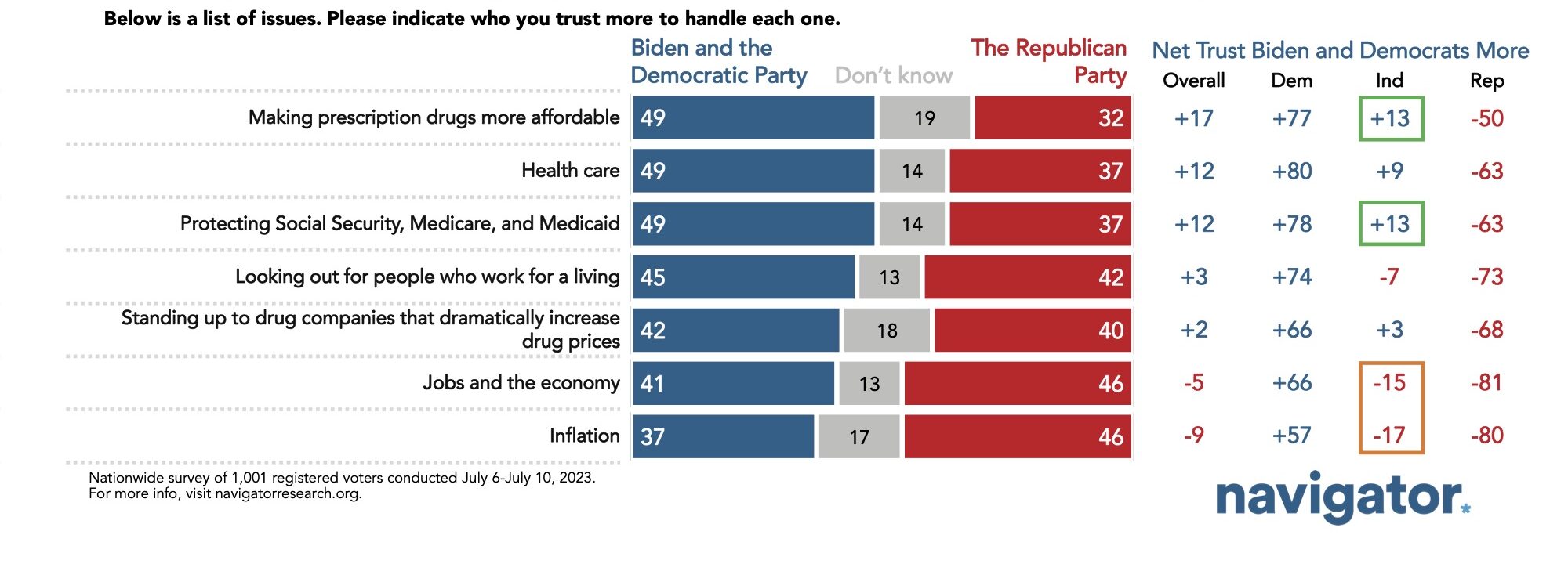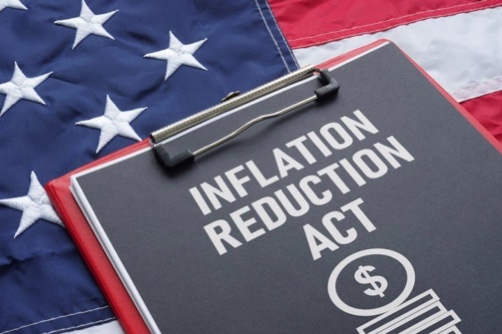The Inflation Reduction Act After One Year: A Guide for Advocates
This Navigator Research report contains polling data on Americans’ latest perceptions of the Inflation Reduction Act nearly a year after being signed into law, including which components of the legislation are most popular, whether Americans believe the legislation will actually achieve policy goals, and how learning more about the Inflation Reduction Act improves trust in Biden and Democrats to handle economic issues.
With the one year anniversary of the Inflation Reduction Act approaching, two in three Americans continue to support the legislation.
By a 43-point margin, Americans support the Inflation Reduction Act when described as legislation “which will give Medicare the power to negotiate lower drug prices, bring down health insurance premiums, and invest in clean energy like wind and solar power” (66 percent support – 23 percent oppose), including nine in ten Democrats (92 percent), three in five independents (58 percent), and two in five Republicans (40 percent). A majority of Americans believe the Inflation Reduction Act “will help families like mine” (52 percent), including most Americans over the age of 65 (53 percent).
- 43 percent of Americans say they have seen, read, or heard about the Inflation Reduction Act, including 13 percent who say they have heard “a lot” about the legislation. Just 27 percent of independents say they have heard anything about the legislation, including 9 percent who say they have heard “a lot”. Most Americans over the age of 65 have heard about the Inflation Reduction Act (57 percent).
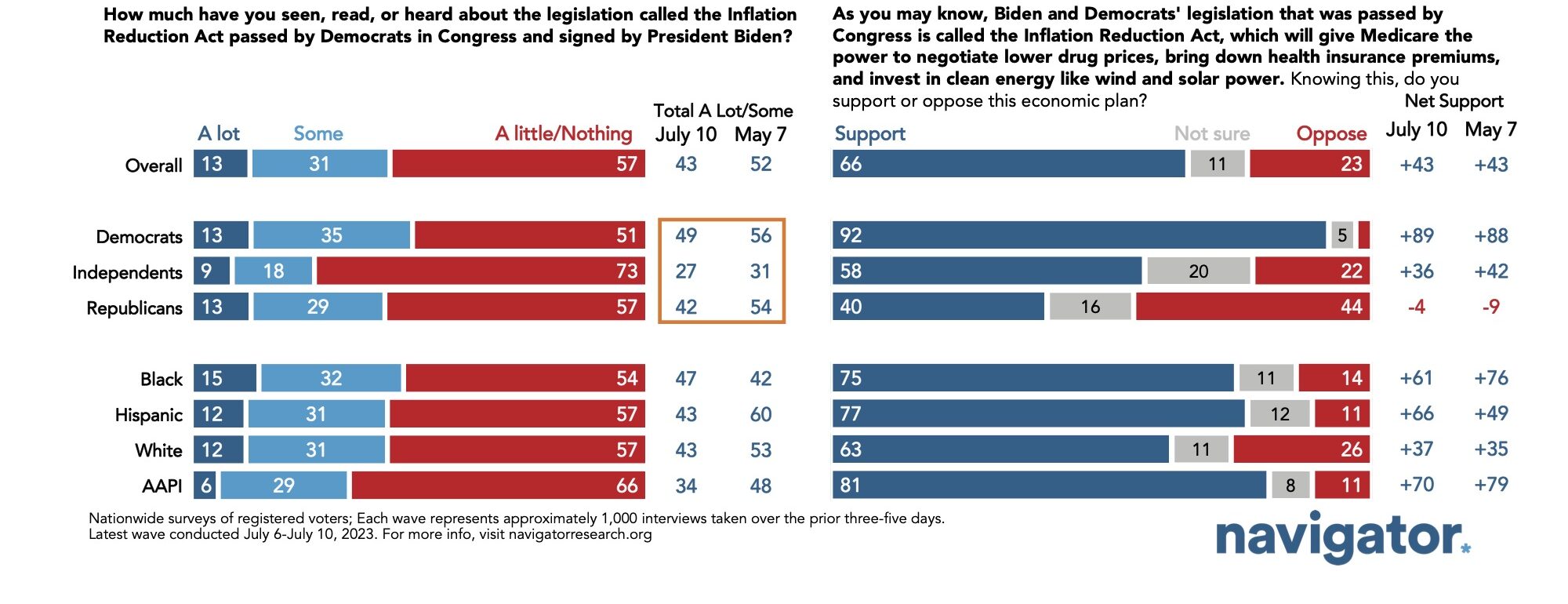
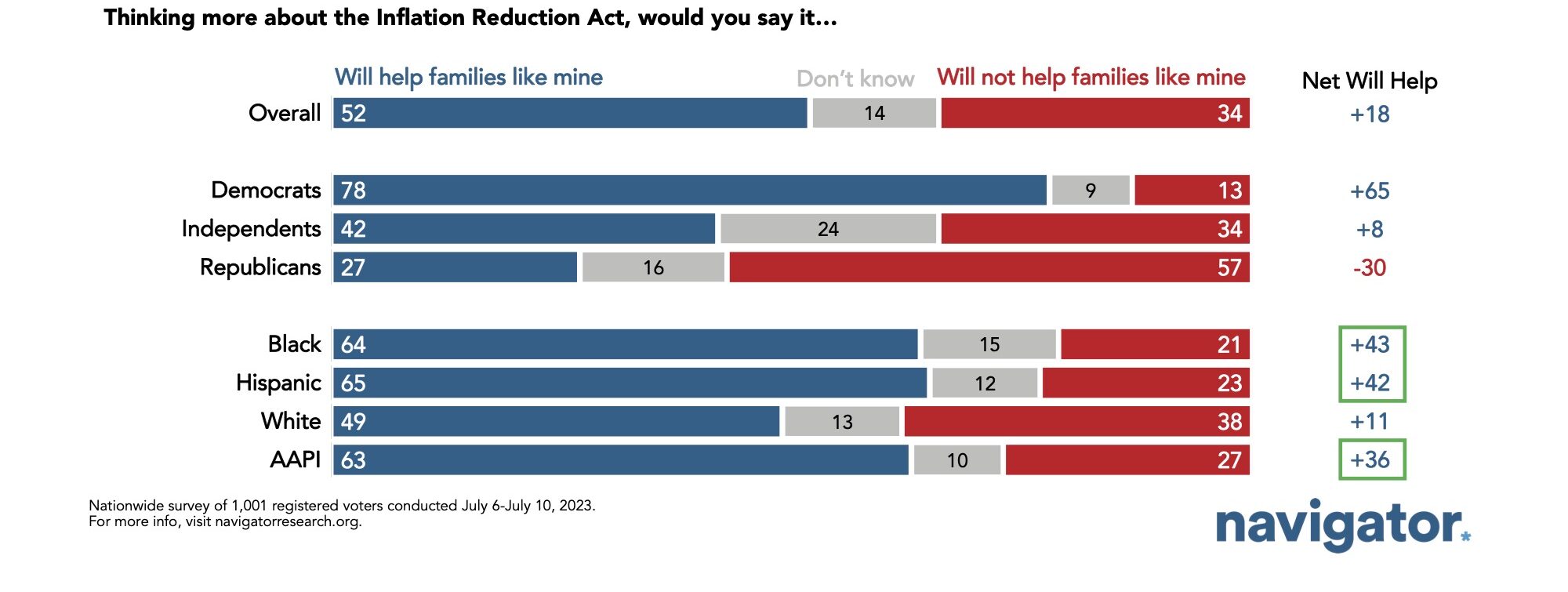
The most popular and credible parts of the Inflation Reduction Act focus on capping insulin costs and giving Medicare the power to negotiate lower drug prices.
Among a list of provisions included in the Inflation Reduction Act, four in five Americans both support and believe the legislation “cap[s] insulin costs for seniors to $35 a month” (net +74; 82 percent support – 8 percent oppose, including support from 90 percent of Americans over the age of 65; 79 percent believe the Inflation Reduction Act does this) and that it “give[s] Medicare the power to negotiate lower prescription drug prices” (net +72; 81 percent support – 9 percent oppose, including support from 84 percent of Americans over the age of 65; 81 percent believe the Inflation Reduction Act does this). Other provisions that are popular, but that fewer believe the law actually does, include:
- Reducing the federal budget deficit by over $300 billion (net +68; 75 percent support – 7 percent oppose; however, only 38 percent of Americans believe this will be done);
- Lowering energy costs by $1,000 per year for the average family and reducing carbon pollution by 40% (net +59; 73 percent support – 14 percent oppose; however, only 54 percent of Americans believe this will be done);
- Requiring large, profitable corporations that pay little to no federal taxes to pay a minimum tax of 15% (net +53; 70 percent support – 17 percent oppose; however, only 53 percent of Americans believe this will be done);
- Providing tax incentives to create more manufacturing jobs in the United States (net +69; 79 percent support – 10 percent oppose; however, only 51 percent of Americans believe this will be done); and,
- Establishing a corporate minimum tax of 15% (net +39; 59 percent support – 20 percent oppose; however, only 53 percent of Americans believe this will be done).
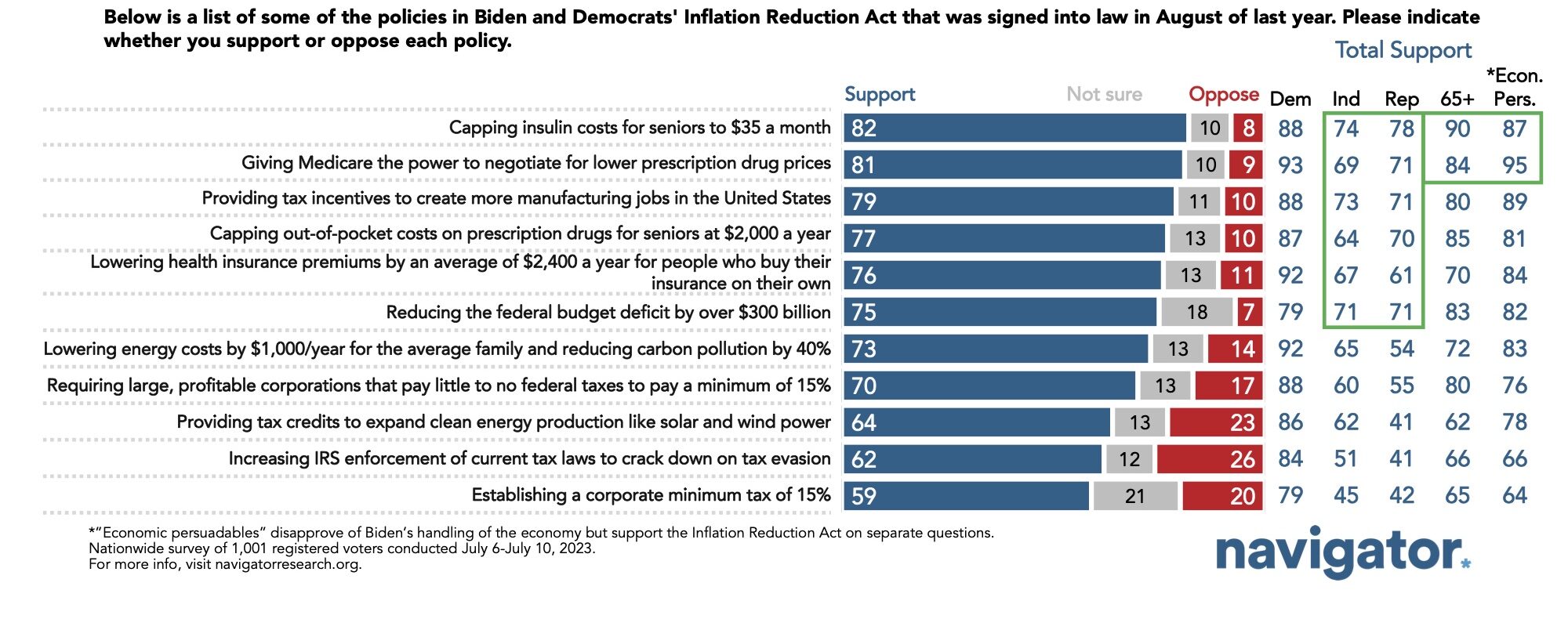
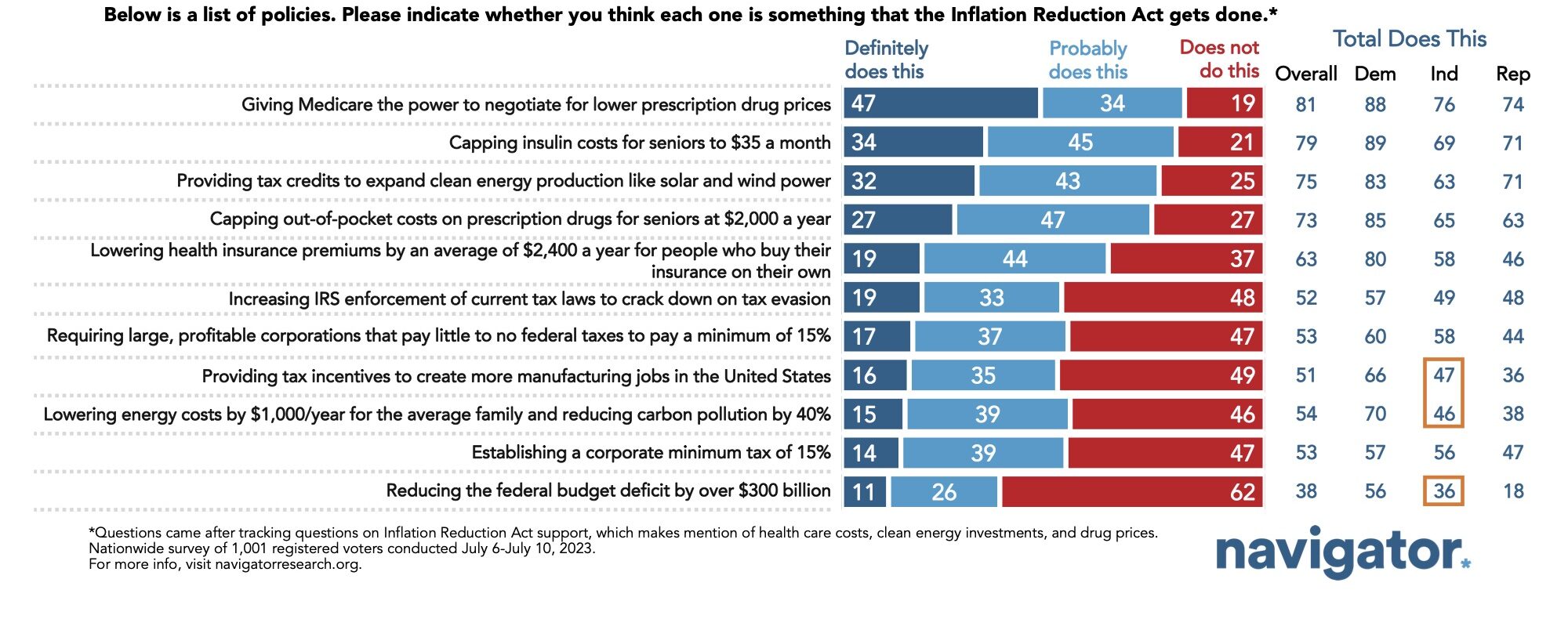
The most convincing statements about the Inflation Reduction Act focus on lowering health care costs, closing corporate tax loopholes, and clean energy job creation.
In a back-and-forth of arguments from supporters and opponents of the Inflation Reduction Act, the progressive argument that the legislation “will jumpstart lower-cost clean energy by expanding wind and solar power, bring down health insurance premiums for people who buy insurance on their own, and lower the price of prescription drugs by letting Medicare negotiate better prices” wins by double-digit margins to the conservative argument that “the Inflation Reduction Act is just another example of runaway government spending that is fueling inflation while killing American energy jobs” (net +16; 58 percent progressive argument – 42 percent conservative argument). In a separate battery, statements seen as the most convincing reasons to support the Inflation Reduction Act focus on cutting costs, closing tax loopholes, and job creation compared to statements about national inflation:
- The Inflation Reduction Act took on price-gouging corporations like pharmaceutical companies to lower prescription drug costs (net +29; 58 percent convincing – 29 percent not convincing);
- As the U.S. faces record inflation, the Inflation Reduction Act lowers health insurance and prescription drug costs so people have more breathing room in their family budgets (net +28; 56 percent convincing – 28 percent not convincing);
- As the U.S. faces record inflation, the Inflation Reduction Act lowers health insurance and prescription drug costs (net +25; 56 percent convincing – 31 percent not convincing);
- The Inflation Reduction Act closes corporate tax loopholes so more can be invested in the middle class (net +18; 51 percent convincing – 33 percent not convincing); and,
- The Inflation Reduction Act has created more than 100,000 new jobs in the clean energy and manufacturing sectors (net +18; 51 percent convincing – 33 percent not convincing).
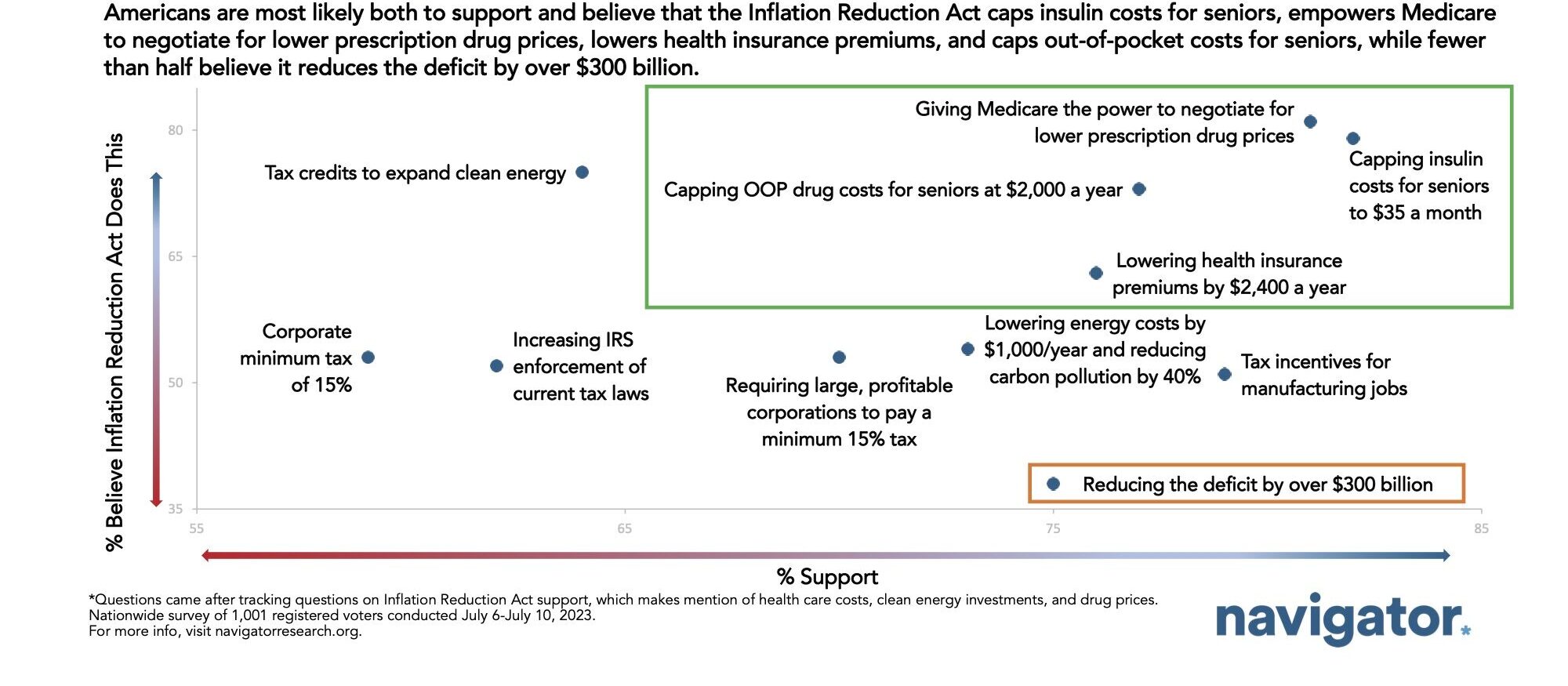
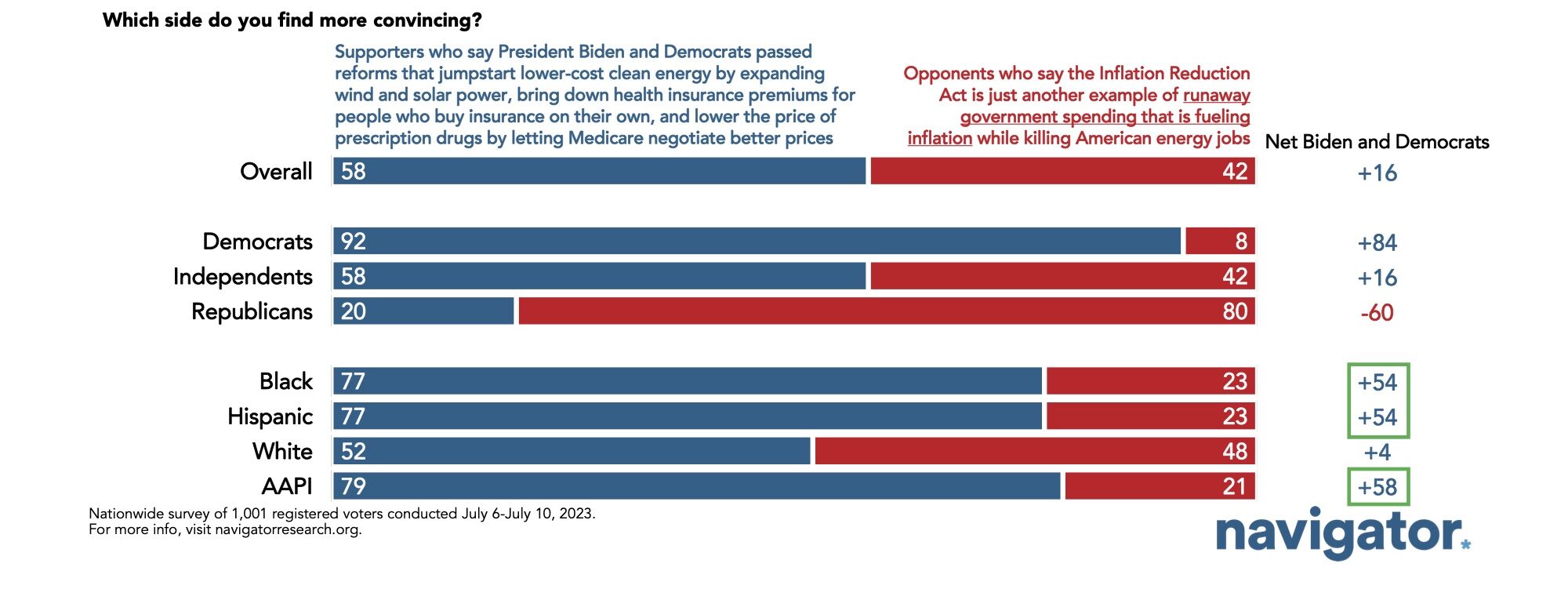
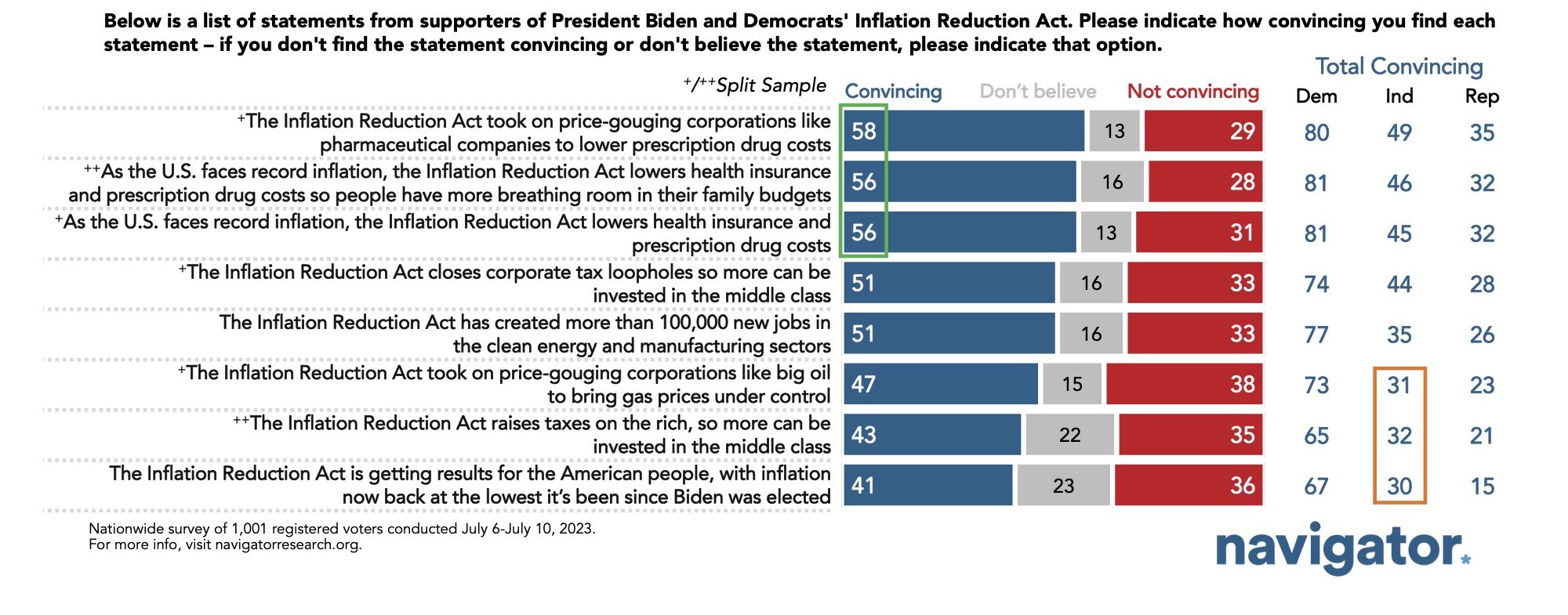
Biden and Democrats make gains and close gaps on trust with economic issues as Americans learn more about the Inflation Reduction Act.
In an initial ask, Republicans have the trust advantage on handling jobs and the economy (net -5; 41 percent Biden/Democrats – 46 percent Republicans) and inflation (net -9; 37 percent Biden/Democrats – 46 percent Republicans), while Biden and Democrats have a slight advantage when it comes to “looking out for people who work for a living” (net +3; 45 percent Biden/Democrats – 42 percent Republicans). After messaging on the Inflation Reduction Act, Biden and Democrats close the gap on trust when it comes to jobs and the economy by 4 points (to net -1; 44 percent Biden/Democrats – 45 percent Republicans) and inflation by 6 points (to net -3; 41 percent Biden/Democrats – 44 percent Republicans), and make further gains on “looking out for people who work for a living” (to net +6; 47 percent Biden/Democrats – 41 percent Republicans).
- Prior to any messaging, Biden and Democrats retain Americans’ trust over Republicans when it comes to making prescription drugs more affordable (net +17; 49 percent Biden/Democrats – 32 percent Republicans), health care (net +12; 49 percent Biden/Democrats – 37 percent Republicans), and protecting Social Security. Medicare, and Medicaid (net +12; 49 percent Biden/Democrats – 37 percent Republicans).
